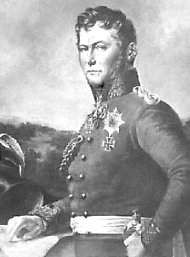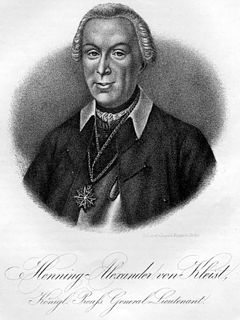
The Pour le Mérite is an order of merit established in 1740 by King Frederick II of Prussia. The Pour le Mérite was awarded as both a military and civil honour and ranked, along with the Order of the Black Eagle, the Order of the Red Eagle and the House Order of Hohenzollern, among the highest orders of merit in the Kingdom of Prussia. After 1871, when the various German kingdoms, grand duchies, duchies, principalities and Hanseatic city states had come together under Prussian leadership to form the federally structured German Empire, the Prussian honours gradually assumed, at least in public perception, the status of honours of Imperial Germany, even though many honours of the various German states continued to be awarded.

Friedrich Heinrich Ernst Graf von Wrangel was a Generalfeldmarschall of the Prussian Army. He was nicknamed Papa Wrangel and a member of the Baltic German noble family of Wrangel.

Friedrich Bertram Sixt von Armin was a German general who participated in the Franco-Prussian War and the First World War. In the latter he participated in many battles on the Western Front, including the Battles of Passchendaele and the Lys.

Karl Friedrich von dem Knesebeck was a Prussian field marshal and military adviser in the Napoleonic Wars, notable for designing the campaign plan of the Battle of Leipzig and the subsequent invasion of France.

Anton Wilhelm von L'Estocq was a Prussian cavalry general best known for his command of the Prussian troops at the Battle of Eylau.

Friedrich Leopold Graf von Gessler (or Geßler; was a Prussian Generalfeldmarschall and one of Frederick the Great's most famous cavalry generals.

The German ancient noble family of Pfuel arrived in Brandenburg in the year 926 and later widened their influence to Saxony, Saxony-Anhalt, Mecklenburg, Pomerania, Württemberg, Westphalia, Eastern Europe and Sweden.

Eduard Friedrich Karl von Fransecky was Prussian general who served in the Austro-Prussian War and the Franco-Prussian War.
Friedrich Heinrich Ferdinand Leopold von Forcade de Biaix, aka Heinrich Friedrich Ferdinand Leopold von Forcade de Biaix, aka Friedrich Heinrich Ferdinand Leopold Marquis de Forcade de Biaix, was a Royal Prussian lieutenant colonel. He served in the Prussian Army from 1761-1793. His last command was as Commanding Officer of the 10th Prussian Fusilier Battalion, with which he served in the Rhine Campaigns of 1791, where he was awarded the Kingdom of Prussia's highest military order of merit for heroism, Knight of the Order of Pour le Mérite (1791). He left the Prussian Army after 32 years of service in 1793 as the result of invalidity. At the time of his death, he was the owner of Schleibitz Manor, near Oels, Silesia.
Friedrich Wilhelm von Forcade de Biaix, aka Frideric Guillaume de Forcade was a Royal Prussian Colonel, Schwadronschef of the 2nd Grenadier Company in the 24th Prussian Infantry Regiment, recipient of the Kingdom of Prussia's highest military order of merit for heroism, Knight of the Order of Pour le Mérite (1774), Commandant of Frankfurt/Oder, and Presbyter of the French congregation of Frankfurt/Oder.

Henning Alexander von Kleist was a Prussian Lieutenant-General and Chief of Fusiliers. He was a winner of the Order Pour le Merite and hereditary lord of properties at Juchow, Zammenz and Falkenhagen. He was also Governor of the Spandau Citadel.
Friedrich Gisbert Wilhelm Freiherr von Romberg was a German officer who rose to lieutenant general (Generalleutnant) in the Prussian Army. As governor of Stettin in 1806, he surrendered without a fight, for which he was sentenced to life imprisonment by a Prussian military tribunal.

Joachim Bernhardt von Prittwitz and Gaffron (1726–1793), born in Groß Läswitz, died in Berlin, was a Prussian officer credited with saving the life of Frederick the Great at the Battle of Kunersdorf. At the time, he was a cavalry captain in Hans Joachim von Zieten's Hussar regiment. He became the head of gendarmes regiment, and inspector general of the cavalry of Brandenburg March and Magdeburg in 1775. He was promoted to lieutenant general in 1785 and general of cavalry in 1788. Frederick awarded him the Order Pour le Mérite and the Order of the Black Eagle. In 1851, Prittwitz was included on the panels of the Equestrian statue of Frederick the Great as one of the key figures in the establishment of the Prussia state.

Dubislav Friedrich von Platen was a Prussian officer in Frederick the Great's army. A cavalry general, he was also Governor of Königsberg, a Knight of the Order of Saint John, and a recipient of the Order of the Black Eagle. An active cavalry officer in all of the wars fought by Frederick—the War of Austrian Succession, the Second Silesian War, the Seven Years' War and, finally, the War of Bavarian Succession—he was memorialized on Equestrian statue of Frederick the Great in 1851 erected by Frederick's great-great nephew, Frederick William IV.

Kaspar Ludwig von Bredow was a Prussian lieutenant general, Knight of the Black Eagle Order, recipient of the Order Pour le Mérite and heir to Ihlow. He is regarded as one of the Crown Prince Frederick's military mentors.

Anton Friedrich von Krockow (4 January 1714 in Polzin, Pomerania – 7 September 1778 in Landshut) was a Prussian lieutenant general.
Heinrich Gottlob von Braun was a Prussian general of infantry. He served Frederick the Great during the War of Austrian Succession, and received the Order Pour le Mérite and the Black Eagle Order. In 1851, he was also memorialized on the Equestrian statue of Frederick the Great.

Peter Ernst von Pennavaire ], was the son a French advocate (attorney) in Toulouse, who had fled from France in about 1685. He served in Prussian army, achieving the rank of lieutenant general of cavalry and proprietor of the Leib-Carabiniers. He was the recipient of both the Black Eagle Order and Pour le Mérite. At the Battle of Breslau, when he was 80 years old, he led his cavalry in a charge at the Austrian front. He died of complications from injuries received at the Battle.

Joachim Friedrich von Stutterheim („Alt-Stutterheim“),. He was known as the Old Stutterheim to distinguish him from his younger brother, Otto Ludwig (1718–1780), also a lieutenant general in Frederick the Great's army.

Ludwig August von Stutterheim served Frederick the Great and his successors in the War of Bavarian Succession, the Kościuszko Uprising, and the wars of the Fourth and Sixth coalitions. In 1794 he earned the prestigious Pour le Mérite award for his distinguished actions. He was promoted major general in 1807 after courageous behavior at the Battle of Eylau. He became a lieutenant general in 1811 and general of the infantry in 1824.






















